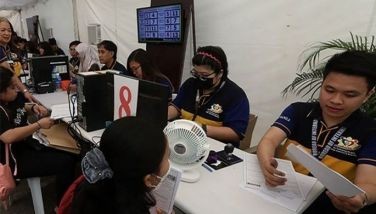No catch-up learning plan from DepEd

While ensuring the safety of students and teachers during this pandemic is important, much more attention should be given to addressing learning gaps exacerbated by the new-normal hybrid classes.
Other countries are already coming up with new programs recognizing the huge disruptions on learning that occurred, especially during the first year under strict lockdowns. The proposed or ongoing measures can be extreme – like having students repeat the entire academic year or radical like reducing the curriculum to just a few key subjects that students can focus on and learn well.
So far, the Philippines has not come up with a rescue plan on how to bridge the learning gaps that have been created by pure online classes, the use of delivered self-instructional education materials that teachers need to follow up with their students, or a mix of both.
One of the recommendations of the United Nations Educational, Scientific, and Cultural Organization (UNESCO) is to give students additional time to learn, either through the summer break or weekends, or a longer school day.
In the Philippines, for school year 2020-2021, the Department of Education (DepEd) allowed the holding of remedial classes during the summer break, but only for students who received a grade lower than 75, and only through the remote learning tools made available during the pandemic.
Definitely, for the current SY 2021-2022, there is no reference of any learning catch-up plan. A good indicator for this is the detailed budget allocation for DepEd, as approved by the President for the current fiscal year, where the only new major expenditure item has been for the provision of additional health safeguards with the expected resumption of face-to-face classroom learning.
Doubling learning loss
By the time primary and secondary classes end in June, some 27 million students enrolled in public schools will have doubled their learning disability; and if no programs are laid on the table for funding for next year’s state budget, this handicap could more than triple.
Already, our public school students are behind in knowledge abilities as compared to their peers in other countries. In the Trends in International Mathematics and Science Study 2019 (TIMSS), Filipino Grade 4 students surveyed had scored significantly lower than their counterparts in 57 other countries.
The results, published on Dec. 8, 2020, showed that between 81 and 87 percent of the surveyed Filipino students were deficient in even the low international benchmark levels of math and science, respectively.
The remaining 19 percent of students who qualified in the low level in math had only “some basic mathematical knowledge,” while the remaining 13 percent of students who scored low in science had only a “limited understanding of scientific concepts and limited knowledge of foundational science facts.”
To echo a statement in a World Bank report issued mid-2021 (which was later retracted after DepEd Secretary Leonor Briones negatively reacted), 80 percent of children in the Philippines “do not know what they should know in school.”
The World Bank report, by the way, was based on three assessments that the Philippines participated in: the TIMSS of 2019, the more demanding Program for International Student Assessment (PISA) of 2018, and the first cycle of the Southeast Asian Primary Learning Metrics (SEA-PLM) in 2019.
It will be very interesting to dive into the more recent assessment results of these three surveys, which you and I can safely surmise to have worsened with the overly long closures of classrooms in our public elementary and high schools during this pandemic.
Private sector to the rescue
In the absence of any immediate solutions to this learning loss, and more so to address below-minimum learning proficiency levels, what can be done? Perhaps, similar to the occasion in the last decade when the DepEd raised the urgent need for more classrooms, the private sector can once again step in.
More than a sense of altruism, businesses have a far bigger stake in having a workforce future-proofed for the expected big changes coming with the anticipated fourth industrial revolution (IR4) where artificial intelligence, the Internet-of-Things, automation, and robotics will dictate growth.
More than ever, a deeper comprehension of math and science will be needed in entry-level employees. A cleaner, for instance, will be expected to supervise an army of robots to keep a multitude of shop floors free from dirt and grime.
Accelerated learning
One of the more popular alternatives being pushed these days, as the pandemic seems to be shifting to endemicity, is the adoption of an accelerated learning mindset where condensing several years of school into a few months is deemed possible.
The concept of accelerated learning is also being regarded as a future trend in education, and a number of countries are preparing to institute major changes in learning.
While the Speed School Model in Ethiopia, which required government intervention to condense the first three years of primary schooling into just 10 months, is an option the DepEd can adopt in future, the private sector can come up with its own initiatives.
A number of non-profits that have developed digital tools to accelerate learning can be harnessed through private sector financial support. Zearn, for example, has a math-learning app that can be made available to public schools through private sector funding.
I’m sure there’s a ton of other interventions that can be tapped; all that’s needed is the decision to do so.
Facebook and Twitter
We are actively using two social networking websites to reach out more often and even interact with and engage our readers, friends and colleagues in the various areas of interest that I tackle in my column. Please like us on www.facebook.com/ReyGamboa and follow us on www.twitter.com/ReyGamboa.
Should you wish to share any insights, write me at Link Edge, 25th Floor, 139 Corporate Center, Valero Street, Salcedo Village, 1227 Makati City. Or e-mail me at [email protected]. For a compilation of previous articles, visit www.BizlinksPhilippines.net.
- Latest
- Trending






























